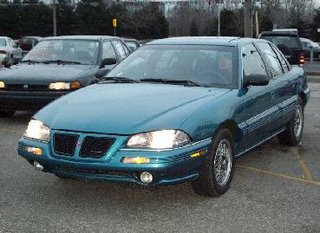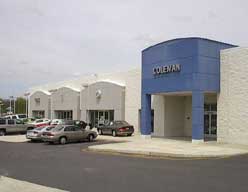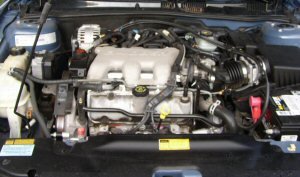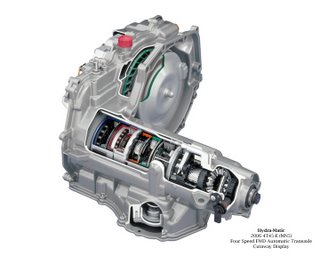Dear Mr. General Motors: essay three

Now that I have covered the some of the history and what I feel are the more important things that need to be done to the product, I would like to tell everyone here a little story about my first car. Like I said before when I gained the privilege to drive a motor vehicle at the young age of 17, I was given the keys to a 1994 Pontiac Grand AM. I did not buy the car my self, but rather my father bought it for my older brother and after my brother moved out on his own, the car was handed down to me. Because it was my first car, and because I have always dreamed of the day when I could drive on my own, I took care of this car like it was a child. I washed... scratch that, I detailed it regularly and kept up with regular maintenance, I never raced it (not like I ever could) and I always parked it in the shade. I guess you could say I had a love for this car, like any red blooded American would for his first car; it's like a right of passage in this great land.
I was shocked and horrified one day to find that my baby was not running the way it always had before. I did what anybody else would do in my shoes, and I parked it in the driveway and took my mothers car for the day. As I was sitting in class I was not taking notes, or listening to the teacher at all, but rather wondering what was wrong with my car. I ran over all of the things I did; change oil? Changed. Check tire pressure? Pressured. Check coolant level? Leveled. The air cleaner? Clean!!! There was about a million and one things that could have gone wrong on any given day, but I couldn't think of one that gave me the driving characteristic I got that day. When I went home at the end of the day, I asked my father what he thought. He told me to put the car up on jacks and drain the oil. I told him I just changed the oil and it was fine, but I did anyway... what I found was a white substance floating in my oil. I knew what had happened and was now seeing dollar signs running up.
If you have never experienced this before, I should hope you never have to. What had happened was a gasket on the intake manifold had failed and as a result coolant
 (remember I had though about the coolant level) was slowly leaking into the crankcase. If any coolant mixes with the oil in the crankcase, the oil loses its viscosity and can no longer lubricate the engine. I was not experiencing high engine temps because I still had "normal" fluids running (at the least the coolant was working and keeping temps down). after I changed the oil and put the car down off of the jack stands, I called my local dealer and asked the techs for some advise; the person I talked to told me to tow, that's right, TOW the car to the dealer and they will run a diagnostic test and tell me for sure. I was right (duh) and asked the tech working on my car what my choices were.
(remember I had though about the coolant level) was slowly leaking into the crankcase. If any coolant mixes with the oil in the crankcase, the oil loses its viscosity and can no longer lubricate the engine. I was not experiencing high engine temps because I still had "normal" fluids running (at the least the coolant was working and keeping temps down). after I changed the oil and put the car down off of the jack stands, I called my local dealer and asked the techs for some advise; the person I talked to told me to tow, that's right, TOW the car to the dealer and they will run a diagnostic test and tell me for sure. I was right (duh) and asked the tech working on my car what my choices were.What I heard next was not to my likening at all. He told me to start looking for a new car, but in the mean time he would try a thicker oil. The reason for all that? The rod bearings in my engine were "shot" and had to be replaced. Total cost of work would exceed the value of the vehicle and so my car was basically totaled. It is a very sad story to tell if you ask me. I realize my car was nothing special, just your run of the mill Grand AM, but still it was my first car, it was a part of me, and I lost it forever. The point of trying a thicker oil (like a 30w-40 instead of a 10w-30) was to see if I could salvage what little w
 as left of my engine for another month or so.
as left of my engine for another month or so.Fast forward to now, and the fact that the same 3.1 liter engine in my 1994 Pontiac Grand AM is still being made the same way, and put into your favorite GM car is scary at best. Any car sold with a 3400 engine has this same defect. Although the chances of it happening to you are low, it can happen and the longer you go the worse it gets. By the way, to replace the gasket costs about $800; the part is only 10 bucks or so, so it is all in labor!
General Motors has done a fine job so far in bringing up the quality of their vehicles, but why the General even let its standards get so low is really the problem. This never should have happened to me. In the 1950's and 1960's problems with Chevy’s leaking oil were considered standard, I know there were black spots on my grandparent's driveway from the 1964 Biscayne wagon they had. But nowadays if your car leaks oil, there may be a very serious problem. Maybe it is really just because everyone is so much more aware of it, and is being more proactive about it.
I doubt that is really it though, and I am sure you will all agree with me when I say I do not want any car I own, be it Chevy or BMW to leak oil or any other fluid on my drive way! Nor would I want my 17 year old kid driving around New Jersey (were it only takes about an hour to cross the state) with a car that might fail him on the high way! Had I been on the high way, moving at the speed limit of 65 with this engine problem, I would most likely had my pistons shoot out of the block. At the very least the engine temps would have gotten to high, and the block would have cracked.
Well, now; Let me get back on track a little here, and establish a real problem within the General... quality is lagging, and there is really nothing in General Mot
 ors to fix this problem. Sure, Car Czar Bob Lutz is trying his best to improve the cars General motors produces, but he does not get to pick and chose what engine a car gets, so General Motors brass puts in the old tired engines and drive trains... Hell, a 35,000 dollar Buick still has a four speed automatic, mean while the Lincoln Zephyr (sorry ford, the MKZ) has a six speed. Standard. So why should GM develop new engines and transmissions? The fact is, the General doesn’t. End of story. The old adage, "if it's not broke, don’t fix it" stays true to today. But it is broke, and GM still will not fix it. That’s why they are only making cars that "can now compete" and not cars that are taking the market.
ors to fix this problem. Sure, Car Czar Bob Lutz is trying his best to improve the cars General motors produces, but he does not get to pick and chose what engine a car gets, so General Motors brass puts in the old tired engines and drive trains... Hell, a 35,000 dollar Buick still has a four speed automatic, mean while the Lincoln Zephyr (sorry ford, the MKZ) has a six speed. Standard. So why should GM develop new engines and transmissions? The fact is, the General doesn’t. End of story. The old adage, "if it's not broke, don’t fix it" stays true to today. But it is broke, and GM still will not fix it. That’s why they are only making cars that "can now compete" and not cars that are taking the market.


0 Comments:
Post a Comment
<< Home